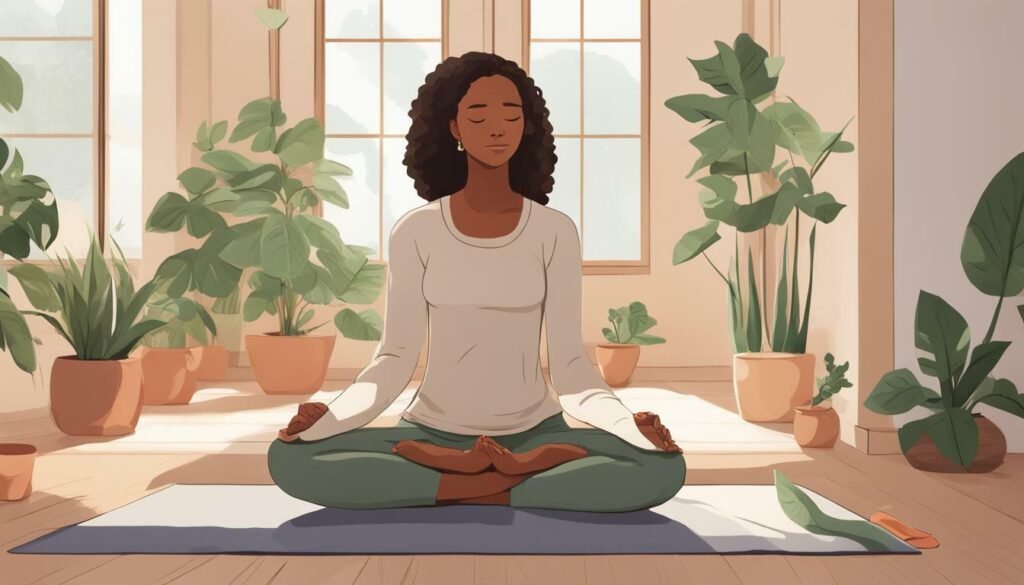Welcome to our guide on the minimalist lifestyle, where we explore the benefits of decluttering and simplifying your life for a healthier and happier lifestyle. A healthy lifestyle is not just about physical health but also includes mental and emotional well-being. Achieving balance in all aspects of life is essential for overall wellness.
Clutter, whether it be physical or mental, can have a significant impact on our well-being. It can weigh us down, create stress, and make it difficult to focus on what truly matters. The minimalist lifestyle encourages the removal of unnecessary possessions and distractions to create a more peaceful and intentional life. It is about focusing on the things that bring true joy and value to our lives.
Incorporating healthy habits such as a balanced diet, regular physical activity, self-care, stress management, and mindfulness can also contribute to a healthier and happier lifestyle. In this guide, we will explore these topics and provide tips for living a fulfilling and minimalistic lifestyle.
Key Takeaways
- The minimalist lifestyle promotes a simpler and intentional life for overall well-being.
- Removing physical and mental clutter can reduce stress and increase focus.
- Incorporating healthy habits such as a balanced diet, physical activity, self-care, stress management, and mindfulness can contribute to a healthier lifestyle.
The Power of Decluttering: Simplify Your Life
Embracing a minimalist lifestyle involves more than just reducing physical clutter in your living space. It also entails decluttering your mind and simplifying your life by eliminating unnecessary distractions. A cluttered environment can contribute to mental clutter, leading to stress, anxiety, and a lack of productivity.
Studies have shown that physical clutter can have significant effects on our mental state, including elevated levels of cortisol, the hormone that regulates stress. Decluttering your living space can not only create a more peaceful and organized environment but also reduce stress levels and improve overall well-being.

Getting started with decluttering might seem overwhelming, but breaking down the process into smaller steps can make it more manageable. Begin with one area of your home and work through it methodically, sorting items into categories such as keep, discard, donate, or sell.
Creating a system for organization can also help maintain a clutter-free living space. Investing in storage solutions such as shelves, baskets, and containers can keep things tidy and easily accessible.
The Importance of Minimalism in Organization
Minimalism can also be applied to organization by focusing on what is essential and eliminating excess. By prioritizing the items that add value to your life and letting go of those that do not, you can create a more streamlined and efficient lifestyle.
Regularly reassessing your possessions and habits can also help prevent clutter from accumulating in the first place. By being more mindful of what you bring into your home and how you spend your time, you can cultivate a minimalist mindset and simplify your life.
In summary, decluttering and embracing minimalism can have numerous benefits for both physical and mental well-being. By taking small steps towards organizing and simplifying your living space and mindset, you can create a more peaceful, productive, and fulfilling lifestyle.
Nourishing Your Body: The Importance of a Balanced Diet
At the heart of a healthy lifestyle is a balanced diet rich in whole foods, including fruits and vegetables. Nutrition plays a significant role in maintaining our physical and mental well-being, so it’s essential to pay attention to what we eat.
When we consume whole foods, we give our bodies the nutrients they need to function optimally. Whole foods are those that are minimally processed and retain their natural composition, such as fruits, vegetables, whole grains, lean proteins, and healthy fats. These foods are packed with vitamins, minerals, and fiber, which help keep our bodies healthy and energized.
Meal planning is a crucial aspect of maintaining a balanced diet. When we plan our meals, we can ensure that we are consuming a variety of whole foods that meet our nutritional needs. Planning ahead also helps us resist the temptation to indulge in unhealthy foods.
Healthy Eating Habits
To incorporate healthy eating habits into your daily routine, start by focusing on adding more whole foods to your diet. Aim to consume a variety of fruits and vegetables, lean proteins, and whole grains. Try to limit your intake of processed foods, sugary drinks, and foods high in saturated and trans fats.
Portion control is also essential. Even healthy foods can be detrimental to our health if we consume them in excessive amounts. Consider using smaller plates to help control portion sizes.
It’s also essential to pay attention to what our bodies are telling us. Eating mindfully, which involves being present while we eat and paying attention to our body’s signals of hunger and fullness, can help us avoid overeating and make healthier food choices.
Meal Planning Tips
Meal planning can feel overwhelming, but it’s a worthwhile investment in our health. Here are some tips to get started:
- Plan your meals a week in advance
- Make a grocery list based on your meal plan
- Prep ingredients in advance to save time during the week
- Cook larger portions to have leftovers for future meals
By incorporating these tips, we can simplify our meal planning process and make it easier to maintain a balanced diet.

“Let food be thy medicine and medicine be thy food.” – Hippocrates
Incorporating whole foods into our diet is an essential component of leading a healthy lifestyle. By nourishing our bodies with the right nutrients, we can boost our energy levels, improve our immune system, and reduce the risk of chronic diseases. So let’s focus on incorporating whole foods and making meal planning a priority in our lives.
Active Living: Embracing Physical Activity
Physical activity is essential to leading a healthy lifestyle. Exercise not only improves our physical health but also helps to improve our mental well-being. Incorporating regular physical activity into our daily routine can help us maintain a healthy weight, improve our cardiovascular health, and increase our energy levels.
There are a variety of physical activities that we can engage in, including running, swimming, cycling, weightlifting, and more. The key is to find an activity that we enjoy and that works for our lifestyle. This will help us to stay motivated and committed to our exercise routine.
Creating a workout routine is an excellent way to ensure that we are including physical activity in our daily routine. This can include setting specific goals, such as running a certain distance or lifting a certain weight. We can also schedule our workouts in advance to help us stay on track.
Tracking our progress is another effective way to stay motivated and hold ourselves accountable. This can include keeping a log of our workouts, tracking our progress towards our fitness goals, or using wearable technology to monitor our activity levels.

Living an active lifestyle goes beyond just formal exercise. It also includes finding ways to incorporate physical activity into our daily routine. This can include taking the stairs instead of the elevator, going for a walk during our lunch break, or doing household chores such as gardening or cleaning.
By embracing physical activity and incorporating it into our daily routine, we can improve our overall health and well-being.
Cultivating Mental Health: Practicing Self-Care and Stress Management
At times, life can be overwhelming, leading to feelings of stress and anxiety. It is essential to prioritize mental health in our daily routines to maintain a healthy lifestyle. Practicing self-care and stress management techniques can help alleviate these negative emotions, allowing us to feel more relaxed and centered.
Self-care is any activity that promotes physical, mental, or emotional well-being. It can be as simple as taking a few minutes for yourself each day to recharge and rejuvenate. Some self-care practices include taking a warm bath, enjoying a cup of tea, or going for a walk in nature.
Stress management techniques are also crucial for maintaining good mental health. These techniques can help us deal with stress in a healthy way, allowing us to feel more in control. Some stress management techniques include deep breathing exercises, meditation, or yoga.
In addition to self-care and stress management, relaxation techniques can also be beneficial for promoting mental health. These techniques involve intentionally creating a state of relaxation in the mind and body. Some relaxation techniques include visualization, progressive muscle relaxation, or listening to calming music.
Mindfulness is another powerful tool for cultivating mental health. Mindfulness involves being present in the moment and fully engaged in our surroundings. It can help us feel more grounded and connected to ourselves and others. Some mindfulness practices include meditation, deep breathing exercises, or simply being aware of our thoughts and feelings as they arise.
By incorporating self-care, stress management, relaxation techniques, and mindfulness into our daily routines, we can cultivate good mental health and promote overall well-being.

“Self-care is not selfish. You cannot serve from an empty vessel.”
Achieving Fitness Goals: Finding Motivation and Staying Consistent
Setting fitness goals can be daunting, but with the right mindset and plan, they can be achieved. One of the most important factors in achieving fitness goals is motivation. Without motivation, it’s easy to give up when faced with obstacles or setbacks. So how do we stay motivated?
First, we need to set realistic goals. Setting unrealistic goals can lead to frustration and disappointment. Start small and work your way up. It’s better to achieve small goals than to fail at larger ones. Once you have set your goals, write them down and place them where you can see them every day. This will help you stay focused and motivated.
Next, consistency is key. Create a workout routine that works for you and stick to it as best as possible. It’s normal to miss a day or two, but don’t let a missed day turn into a missed week. Keep pushing forward and stay consistent.
Tracking progress is also important for staying motivated. Use a fitness tracker or a journal to log your progress. Seeing progress, no matter how small, can be a huge motivator. Celebrate your successes and learn from your setbacks.
Remember, fitness is a journey, not a destination. It takes time and dedication to achieve our goals. Find a support system, whether it be a friend, family member, or a fitness community. Having a support system can help us stay motivated and accountable.

The Road to Wellness: Integrating Mind, Body, and Soul
As we’ve discussed throughout this article, living a healthy lifestyle involves more than just a balanced diet and physical activity. It’s important to also focus on our mental and emotional well-being to achieve true holistic health. This is where the concept of wellness comes in.
At its core, wellness is about finding balance and harmony between our mind, body, and soul. It’s about recognizing that our physical health is interconnected with our mental and emotional health, and taking a holistic approach to caring for ourselves.
One important aspect of wellness is the mind-body connection. Research has shown that our thoughts and emotions can have a significant impact on our physical health, and vice versa. By cultivating positive thoughts and emotions, we can promote overall well-being.
Self-reflection is another key component of wellness. Taking time to reflect on our thoughts, feelings, and behaviors can help us identify areas where we may need to make changes in order to improve our health and well-being.
Gratitude is also an essential element of wellness. Practicing gratitude on a regular basis can help shift our focus from what we lack to what we have, leading to a greater sense of contentment and fulfillment.
By integrating mind, body, and soul, we can achieve a state of true wellness and live a happier, more fulfilling life.

“Wellness is the complete integration of body, mind, and spirit – the realization that everything we do, think, feel, and believe has an effect on our state of well-being.” – Greg Anderson
The Road to Wellness: Integrating Mind, Body, and Soul
At this point in the article, we have explored various aspects of a healthy lifestyle, including the benefits of decluttering, the significance of a balanced diet and physical activity, and the role of mental health, self-care, stress management, mindfulness, fitness, and nutrition. However, true wellness goes beyond just these components. It involves the integration of mind, body, and soul.
The Holistic Approach
Wellness is a holistic concept that encompasses physical, mental, and spiritual well-being. It involves nurturing not just the body, but also the mind and soul. When all three areas are in harmony, we can experience optimal health and true wellness.
The Mind-Body Connection
There is a strong connection between the mind and body. When we experience stress or anxiety, it can manifest physically in the form of headaches, muscle tension, and digestive issues. Similarly, physical activity and a balanced diet can have a positive impact on our mental state, helping to reduce stress and anxiety.
Self-Reflection and Gratitude
Practicing self-reflection and gratitude is essential in achieving a state of wellness. Taking the time to reflect on our thoughts and emotions can help us gain a deeper understanding of ourselves and our needs. Expressing gratitude for the positive aspects of our lives can also help us maintain a positive outlook and reduce stress.
Embracing a Holistic Lifestyle
By embracing a holistic lifestyle, we can achieve true wellness. This involves taking care of our physical, mental, and spiritual health, and finding balance in all aspects of our lives. By integrating mind, body, and soul, we can experience a greater sense of well-being and live a fulfilling life.
In conclusion, a healthy lifestyle involves more than just a balanced diet and physical activity. It involves taking care of all aspects of ourselves – mind, body, and soul. By embracing a holistic approach to health and wellness, we can achieve optimal well-being and live a fulfilling life.
Healthy lifestyle, wellness, balanced diet, physical activity, mental health, self-care, stress management, mindfulness, fitness, nutrition
FAQ
Q: What is the minimalist lifestyle?
A: The minimalist lifestyle is a way of living that focuses on reducing clutter, both physical and mental, in order to create a simpler and happier life.
Q: How can decluttering contribute to a healthier and happier life?
A: Decluttering can have both physical and mental benefits. By removing physical clutter, you can create a more organized and peaceful living environment. Decluttering also allows you to let go of things that no longer serve you, reducing mental stress and promoting overall well-being.
Q: What is the importance of a balanced diet in maintaining a healthy lifestyle?
A: A balanced diet provides your body with the necessary nutrients for optimal health. It helps support a strong immune system, promotes proper digestion, and provides energy for daily activities. Consuming a variety of whole foods, including fruits and vegetables, is key to maintaining a balanced diet.
Q: How can I incorporate physical activity into my daily routine?
A: Finding activities that you enjoy and that fit into your schedule is key to incorporating physical activity into your daily routine. Whether it’s going for a walk, taking a dance class, or participating in a team sport, find activities that you look forward to and make them a regular part of your life.
Q: What are some practical tips for practicing self-care and stress management?
A: Self-care and stress management are vital for maintaining good mental health. Some practical tips include setting aside time for yourself, engaging in activities that bring you joy, practicing relaxation techniques such as deep breathing or meditation, and seeking support from loved ones or professionals when needed.
Q: How can I stay motivated and consistent in achieving my fitness goals?
A: Setting realistic goals, tracking your progress, and finding ways to stay motivated are key to achieving your fitness goals. Celebrate small victories along the way, find a workout routine that you enjoy, and surround yourself with a support system that will keep you accountable.
Q: How can I integrate mind, body, and soul for overall wellness?
A: Integrating mind, body, and soul involves taking care of all aspects of your well-being. This can be done through self-reflection, practicing gratitude, engaging in activities that promote mental and physical health, and finding balance in your everyday life.

